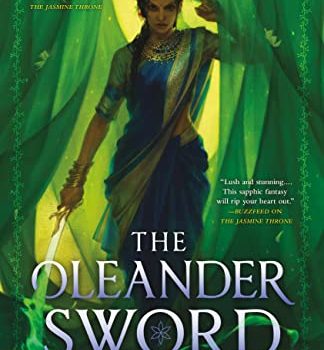Maya C. James Reviews The Oleander Sword by Tasha Suri
 The Oleander Sword, Tasha Suri (Orbit 978-0-316-53856-5, $17.99, 513 pp, tp) August 2022. Cover by Micah Epstein.
The Oleander Sword, Tasha Suri (Orbit 978-0-316-53856-5, $17.99, 513 pp, tp) August 2022. Cover by Micah Epstein.
Priya and Malini have fought, killed, and betrayed to gain power. The Oleander Sword asks and answers the question: what are they willing to do to keep it? Second in the Burning Kingdoms trilogy, this epic, Indian-inspired sapphic fantasy follows Priya and Malini as they join forces against Emperor Chandra, Malini’s cruel, zealous brother and ruler of the Parijatdvipa Empire. Told from multiple perspectives, the fate of the empire is entwined in Priya and Malini’s destinies. After being declared rightful empress of Parijatdvipa by the nameless god, Malini encounters war’s cruelties firsthand as she leads her armies in a slow-marching campaign to dispose of her brother. Outside of the violent battles she wages, she also must maintain the faith of her mostly male generals, some of whom doubt her calling, and others who disrespect and question her every move. Meanwhile, Priya, the newly named Elder of Ahiranya and First Elder Bhumika’s first in command, seeks to rid Ahiranya of the plant-based rot that sickens its people and the lands. But her power is not as simple as it initially seems, and there is a steep, irreversible cost to be paid. I cannot say more without spoiling a massive reveal in the book, but it’s clear one of our protagonists is badly outmatched and totally unaware of the danger that awaits her.
It isn’t just Malini and Priya who are in harm’s way, however. Readers are subjected to high stakes at every turn that seemingly keep climbing without any end in sight. While The Oleander Sword focuses mostly on the attrition of warfare, I found it to be more emotionally intimate than its predecessor. Not just in its romantic themes, but in the innermost thoughts of each character. We already know Priya and Malini are madly in love with one another, even if the relationship seems disastrous and impossible given their circumstances. Surely it seems destined to end in disaster and heartbreak. Yet their moments of refuge with one another, and the yearning (my God, the yearning!) in their correspondence give me moments of hope that their love will survive the treacherous world they inhabit. The stolen glances and moments of privacy only add to the intensity of the challenges they encounter. Outside of Priya and Malini, recurring characters are given the time and space amidst battles and betrayals to forge new relationships with one another. I found it difficult to become invested in some new characters and villains due to the expansive and epic nature of the world, but overall was impressed with complex relationships between eachcharacter. Suri’s ability to write captivating, page-turning dialogue both in the heat of battle and in the slower-paced sections of the book was impressive.
I was certainly eager to learn more about Aditya, Malini’s wise and kind older brother, who finds his altruism to be a sign of weakness on bloody and burning battlefields. His evolving beliefs punctuate the emotional weight of each battle. Lady Bhumika takes what may seem like a more subdued role in some ways – she’s certainly still the same character (and one of my favorite characters of the Burning Kingdom trilogy) but seemingly had less time here than she did in The Jasmine Throne. Despite less time on stage (or perhaps I just wanted to hear from her more often), I found her and Malini’s chapters to be the most compelling.
The Oleander Sword provides much more political intrigue and military strategy than its predecessor. Malini’s careful calculations and sharp observations are a whirlwind to read, and her ruthlessness acts as a constant plot driver. Suri offers more intricate worldbuilding details in the novel too. The sangam, or a spiritual realm and confluence of rivers, hints at a much more complex realms that we have only encountered in fleeting passages and texts. There are some intense questions of theology and faith, especially around sacred texts and claims to authority that made for some interesting points of tension between characters. Readers less interested in the realities of war (e.g. supply chain issues, water, siege strategy) may find their eyes glazed over at certain point, while those interested in accurate portrayals of war may rejoice at the level of detail Suri offers. Regardless, The Oleander Sword certainly seems to tee up a harrowing and epic final installment for The Burning Kingdoms.
Maya C. James is a graduate of the Lannan Fellows Program at Georgetown University, and full-time student at Harvard Divinity School. Her work has appeared in Star*Line, Strange Horizons, FIYAH, Soar: For Harriet, and Georgetown University’s Berkley Center Blog, among others. She was recently long listed for the Stockholm Writers Festival First Pages Prize (2019), and featured on a feminist speculative poetry panel at the 2019 CD Wright Women Writer’s Conference. Her work focuses primarily on Afrofuturism, and imagining sustainable futures for at-risk communities. You can find more of her work here, and follow her on Twitter: @mayawritesgood.
This review and more like it in the November 2022 issue of Locus.
 While you are here, please take a moment to support Locus with a one-time or recurring donation. We rely on reader donations to keep the magazine and site going, and would like to keep the site paywall free, but WE NEED YOUR FINANCIAL SUPPORT to continue quality coverage of the science fiction and fantasy field.
While you are here, please take a moment to support Locus with a one-time or recurring donation. We rely on reader donations to keep the magazine and site going, and would like to keep the site paywall free, but WE NEED YOUR FINANCIAL SUPPORT to continue quality coverage of the science fiction and fantasy field.
©Locus Magazine. Copyrighted material may not be republished without permission of LSFF.








